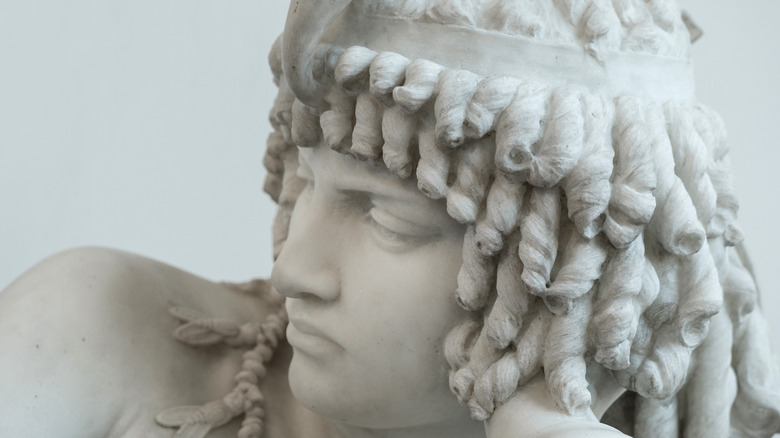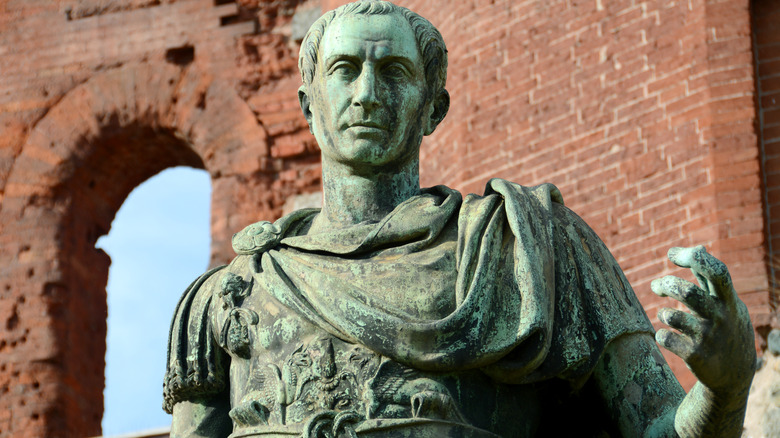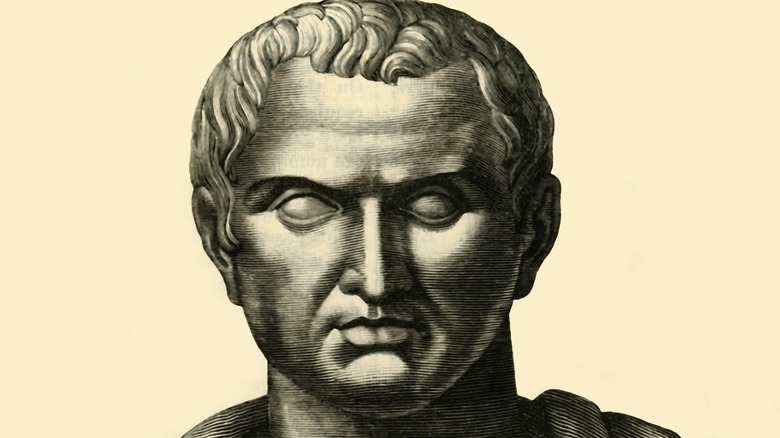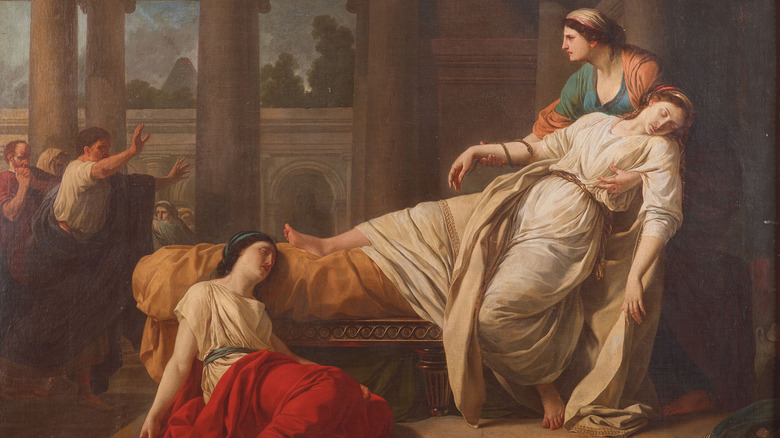The Truth About Cleopatra, Mark Antony, And Julius Caesar's Love Triangle
Love can change the course of history. When King Henry VIII became infatuated with Anne Boleyn while still inconveniently married to first wife, Catherine of Aragon, a failed request for an annulment from the pope led the monarch to step away from the Catholic Church. Then, as head of the Church of England, a position he gave himself, the king married Anne, and four more besides. His actions weakened his empire (via History). The king wasn't the first to lose his focus as a ruler in the throes of passion. King Edward VIII abdicated his throne to marry American divorcee Wallis Simpson, changing the succession trajectory for English royalty, said Britannica.
Perhaps one of the most powerful liaisons to alter history's narrative occurred between Cleopatra VII of Egypt, the Roman general Mark Antony, and the Emperor Julius Caesar, which ended the lives of two paramours and brought down the Ptolemaic dynasty, said History. While some blame Cleopatra, known for her seduction prowess, for the lovers' debacle, the truth is more complicated than that. The tale involves not only the travails of love, but also the lure of power — perhaps the greatest aphrodisiac of all.
Caesar was Cleopatra's lover first
Even Cleopatra's early life sounds like a soap opera. Her father, Ptolemy XII, died in 51 B.C. and elevated her, at the age of 18, to co-regent with her 10-year-old brother. Egyptian tradition dictated that she marry either a sibling or a son and their union (and leadership) helped lead the country from civil war to better times, according to the BBC. That is, until 48 B.C., when Cleopatra removed Ptolemy XIII's name from government papers and put her own visage on legal tender. She was exiled.
But she had a plan to regain her throne that involved Roman Emperor Julius Caesar. She allegedly hid in a rug, then had it rolled up and delivered to Caesar (above). Once in his presence, she seduced the married leader and convinced him to help her win back Egypt. Once she became queen again, she married her 11-year brother Ptolemy XIV, even though her love affair with Caesar continued and she bore his son, called either Ptolemy XV or Caesarion. Caesar would be assassinated in the Senate in 44 B.C. (from King's College).
Mark Antony becomes besotted
When Mark Antony (above) began overseeing Rome's eastern provinces in 41 B.C., Cleopatra hoped to form an alliance with him, both romantic and political, as she once had with her former lover, Caesar. She even met Antony once decked out as the goddess of love, Venus. Antony took the bait and pledged to aid her (via History). Problem: Antony already had a wife, Fulvia, who still lived in Rome. The jilted and jealous woman told her troubles to the Roman general Octavian, and asked him to punish her wayward husband. Antony returned home to do some damage control and married Octavia, Octavian's sister, even as Cleopatra delivered his twin babies and continued her command over Egypt. In reality, the love triangle between Caesar, Antony and Cleopatra never existed; rather, it consisted of Anthony, his wives, and Cleopatra (from Your Tango).
Antony started a fight with Octavian several years later by proclaiming Cleopatra's son Caesarion, rumored to be Caesar's progeny, as the emperor's heir, said History. The infuriated Octavian accused Antony of abandoning Rome to create a new land in Egypt. The price for supporting Cleopatra and her family would be high.
A messy ending
The battle to prove who should succeed Caesar's leadership would take down the lovers. Octavian made both Antony and Cleopatra an enemy, declaring war not only on the man who betrayed his sister, but also Antony's lover and her realm, according to Ranker. The Battle of Actium in 31 B.C. became Cleopatra and Antony's first major defeat, and was followed by another lost battle in Alexandria a year later, according to History. Cleopatra hid in a mausoleum, and Antony, thinking she had perished, killed himself with his own sword. Before he perished, a messenger took him to Cleopatra, where he urged her to reconcile with Octavian.
Cleopatra would soon follow her lover into the afterlife. First she buried Antony, and then kept her promise to met with Octavian. Finally, she entered her chamber with two servants and committed suicide. Legend has it that she allowed an asp, a poisonous snake affiliated with royalty, to bite her. Octavian (who became Emperor Augustus I) killed her son Caesarion, and with his newly consolidated empire, consisting of Rome and Egypt, ruled until 14 A.D., when he died at age 75.



